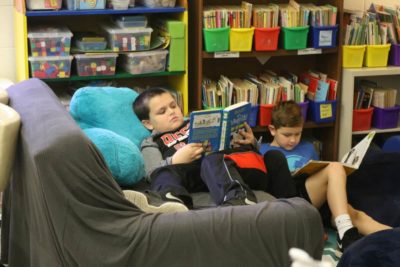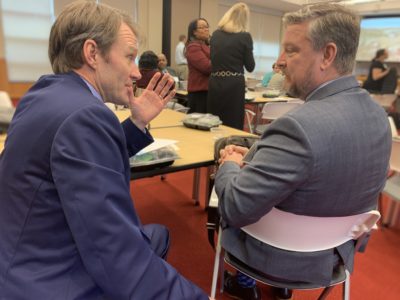
Literacy is a right, not a privilege. An ambitious vision for what we should see for every child across every community in our state no matter the zip code. Why would we settle for anything less than having every student graduate with the necessary literacy skills to be college and career ready?
We have, over the last several decades, failed our students in our state where more than 40% of our students are not able to demonstrate reading proficiency in third grade — and the percentage is much higher in some of our counties.
Teachers are working hard to teach their students how to learn to read in the early grades, and upper elementary and secondary teachers are working hard to help their students read to learn. Secondary teachers will often express frustration with the low literacy skills their students come with and often are heard saying, “But I’m not a reading teacher. I don’t know how to teach my students how to read.”
What we know about teachers is they can’t work any harder, but what we can do is make sure they have the knowledge, skills, and correct resources to know how to teach reading no matter the age of the student. Teachers would much rather use techniques that are proven to work based on the research on the reading brain than use instructional practices founded on pedagogy and false theories about reading that seem to work for less than 60%. We owe it to our teachers across this state to provide them with the knowledge on the current research on reading development. But what needs to change?
As State Board of Education member JB Buxton said in a recent EdNC article, the definition for high quality reading instruction is the centering point for policies and practices.
“The goal of having a definition is that it’s the anchor,” Buxton said. “It’s the anchor for all the professional development, for the way in which districts are doing work, for what we say to universities about what we want to characterize their preparation (of pre-service teachers) or their professional development, for what vendors ought to be offering. It just becomes a clear anchor or all the work we do around early literacy, so we’re all on the same page, speaking the same language, focused on the same things.”
As the previous director of literacy for Wake County Public School System and now the principal of an elementary school, I could not agree more! The state of North Carolina was on the right track by convening a B-12 Literacy Committee within the Department of Public Instruction and having the State Board of Education adopting a Collaborative Guiding Framework for Action on Early Reading.
I participated in one of the three convening groups of stakeholders given the opportunity to provide feedback on a working definition of high-quality reading instruction. It was very exciting to be in a room full of educators discussing the importance of every word within the definition. Many of us listened to the possible mixed messaging or missed opportunities of meaning based on word choice. On April 3, Barbara Foorman, a national literacy expert, put forth edits to the definition so that it would read as follows:
“High quality reading instruction is grounded in the current science of reading regarding the acquisition of language (syntax, semantics, morphology and pragmatics), phonological and phonemic awareness, accurate and efficient word identification and spelling, world knowledge and comprehension. It is guided by state-adopted standards and informed by data so that instruction can be differentiated to meet the needs of individual students. High quality reading instruction includes explicit and systematic phonics instruction, allowing all students to master letter-sound relations so that they can understand the meaning of increasingly complex texts.”
There is meaning in each of these words or phrases that would drive change in North Carolina impacting what teachers learn in their teacher prep programs, the policies adopted by our State Board of Education, the recommendations from the Leandro report, Read to Achieve legislation and practices, the instructional materials and assessments purchased from vendors, and most importantly, the daily instructional practices and decisions teachers make as they develop literate students to be college and career ready. Every word counts! We have been operating on a philosophy of teaching reading that is not grounded in the current reading research.
When I read an EdNC article on experts expressing concern about proposed definition of high-quality reading instruction, I was absolutely dismayed and discouraged to read the newest definition circulated by the B-12 committee:
“Grounded in the science of reading, high quality reading instruction is guided by state-adopted standards, evidence-based planning and teaching, and the ongoing monitoring of essential skills and understanding to support the learner in comprehending and engaging with increasingly complex texts.”
Most of the impactful words are gone that would anchor the work. We must demand for the definition to bring change, to light a fire under our university professors, vendors, legislators, and teachers to ensure that all students are literate in North Carolina by the time they graduate. Why would the B-12 Committee make this change without taking into consideration the input from experts in the field? Did they want to keep vendors or some university professors happy? Did they think teaching reading based on the current research would be too much for teachers?
If the State Board of Education truly wants change for our students and their future, please take the time to ask questions about how and why such a strong definition of high quality reading instruction in April could have been so watered down to the definition in May. If you agree with the vision of literacy is a right, not a privilege, please get the anchor of this critical and life-changing work right by starting with a clear and meaningful definition of high-quality reading instruction.
Recommended reading



